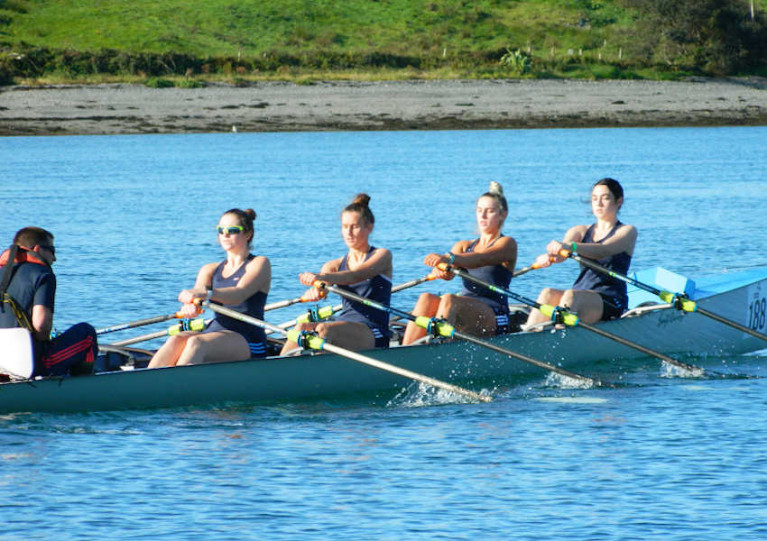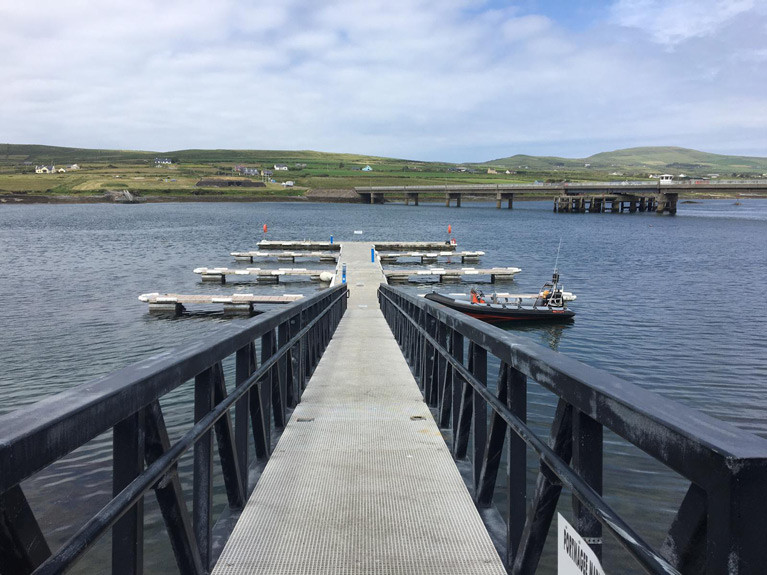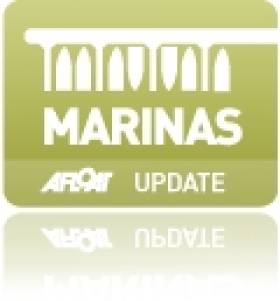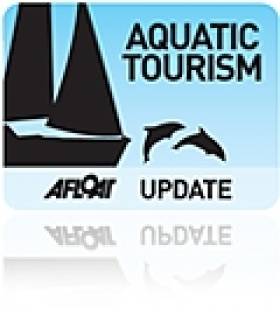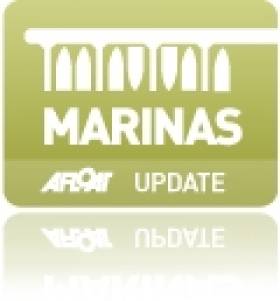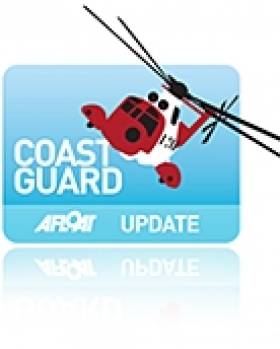Displaying items by tag: Portmagee
Intense Battles In Portmagee At 2020 Irish Offshore Rowing Championships
Coastal rowing is one of the fastest growing sports in the world, with Ireland at the forefront — and this showed in the competitive atmosphere at the Irish Offshore Rowing Championships, writes David Hussey.
Portmagee Rowing Club El Nino in South Kerry hosted the event on Saturday 26 and Sunday 27 September. Usually a single-day affair, the senior A-grade races were spread out over the weekend to abide by current public health guidelines.
Heats were needed in most events, with the highlight on Saturday being the women’s quad final — featuring a packed field of 12 boats on the starting line.
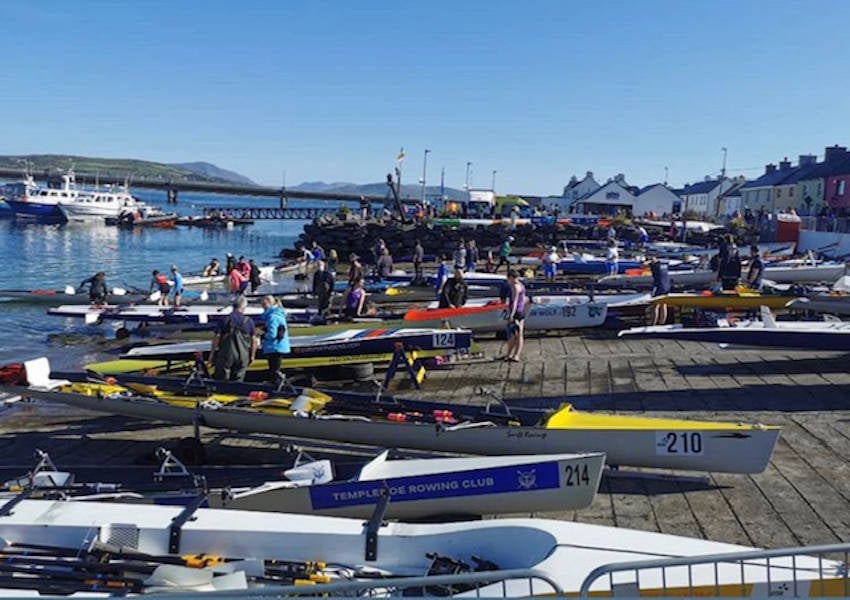 Boats lined up on the Portmagee slip at the 2020 Irish Offshore Rowing Championships
Boats lined up on the Portmagee slip at the 2020 Irish Offshore Rowing Championships
As previously reported on Afloat.ie, reigning champions Killorglin — featuring Olympic rower Monika Dukarska — made it three in a row in this event, and then two of the crew went on to win the doubles contest.
The mixed doubles also was an intense battle with a novel pairing of Kealan Mannix and his sister Alyssa taking the gold for Rosscarbery.
On Sunday, the standout performances came from the Myross/Castletownshend composite in the quad. Stung by last year's defeat due to a poor start, the Cork crew spent 12 months waiting to avenge their loss. They exploded off the start line and established an early lead which they held all the ways around the course.
The men’s single featured an intense battle between John Harrington from the Galley Flash club and Kealan Mannix of Rosscarbery. Kealan did just enough in the last part of the race to forge ahead and claim a second gold.
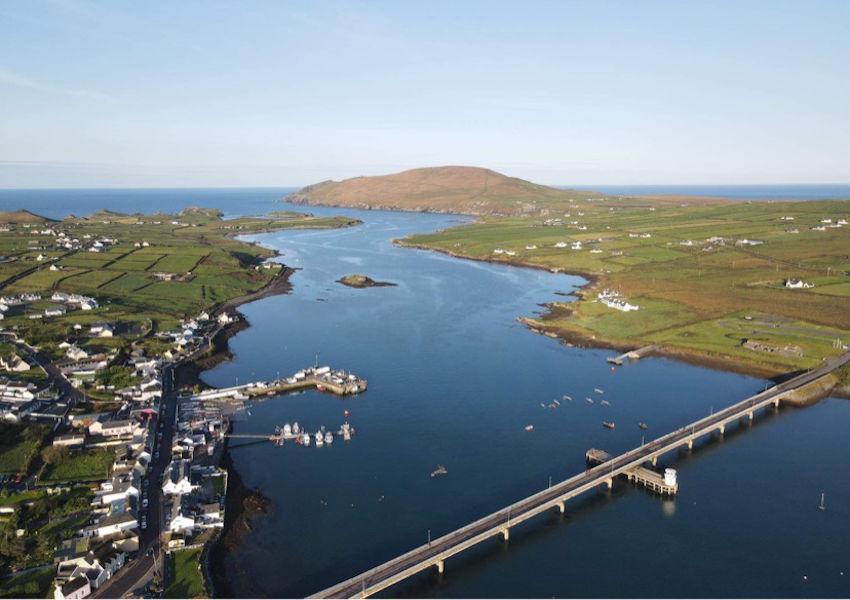
Monika Dukarska dominated the women’s solo with an explosive start, and Donegal Bay came from behind to record a famous victory in the men’s doubles.
Running any sports event in these times can be very challenging due to the coronavirus guidelines. The athletes have to compete in an isolated environment to keep them safe, and while 100 spectators are allowed at this present time, the club felt it best to ask that no patrons attend this event.
Portmagee Rowing Club El Nino wish to thank all the voluntary help that they received from the community in Portmagee; the fishermen who allowed the club to move their boats and fishing gear to give full use of the slip all weekend; the safety boat crews and boats; the help and support from other traditional rowing clubs in South Kerry; and also all stewards and helpers who freely gave their time.
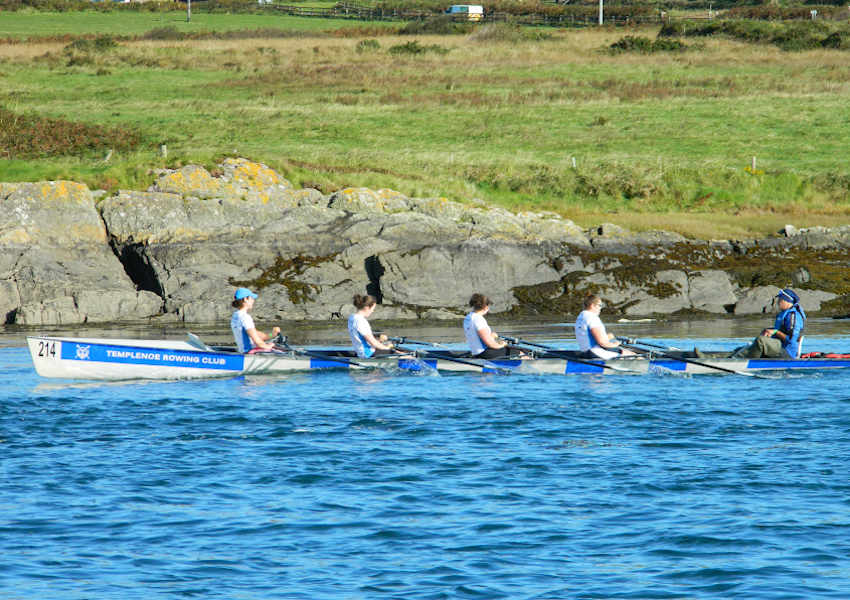 Templenoe Rowing Club’s 214 boat with Gerard van Deventer coxing, Isobel van Deventer, Corina van Deventer, Heather O’Donoghue and Helen Harvey
Templenoe Rowing Club’s 214 boat with Gerard van Deventer coxing, Isobel van Deventer, Corina van Deventer, Heather O’Donoghue and Helen Harvey
The club would like to thank the members of An Garda Siochana for all their help up to and during the weekend; Kerry County Council for cleaning down the slip; and all the local businesses who supported this regatta.
It is onwards and upwards for our sport and we know that like all sports, we will have to continue to restrict our numbers of competitors and spectators at our events until this pandemic has passed.
To all fellow clubs, Portmagee Rowing Club El Nino gives thanks for attending and making this a superb weekend — and all look forward to next year and competing in the championships in Bantry, Co Cork.
Portmagee Seasonal Visitors Pontoon Re-Opens for Visitors
The pontoon mini marina situated in the picturesque village of Portmagee on the County Kerry coast will open its gates once more on July 1st. The sixteen berth pontoon which services the local Skelligs boats as well as visiting yachts and ribs from all across the country.
The pontoon has power and water services as well as toilet and recycling facilities adjacent to the entrance. It also has a lovely café & the Mooring Bar & Restaurant metres from the entrance and is the ideal place to pull in for a night or two.
As Afloat previously reported, the pontoon has just been awarded the Blue Flag status for the first time since opening in 2014. Managed by Kilrush Marina the pontoon has undergone additional investment with upgrades of new entrance signage, additional life buoys, fire extinguishers and fencing.
 Ger Kennedy of Portmagee Seasonal Visitors Pontoons
Ger Kennedy of Portmagee Seasonal Visitors Pontoons
Whether you would like to explore Valentia Island or are just passing looking for somewhere to pull in for shelter, the hammerhead is kept completely free for visiting yachts. The overnight berthage rate is €20 per night if you mention Afloat Magazine and there is a special offer to stay two nights and get the third night free.
For further information contact Ger Kennedy on 087 2390010 or Kilrush Marina on 065 9052072.
Portmagee Marina Pontoons Set For Second Season in County Kerry
#irishmarinas – Portmagee Marina pontoons are set for a second season of operation, built by L&M Keating Ltd, for Kerry Co Council, the 20–berth facility was opened in 2014 in the pretty port of Portmagee.
It is operated by Kilrush Marina who also operate the 120–berth County Clare facility. Most of the berths are occupied by the fleet of Skellig passenger boats that operate from Portmagee, however there are a number of berths reserved for visitors which have proved to be a very popular overnight stop off for cruising yachts during 2014.
Portmagee offers a 'traditional Kerry welcome' and the marina is situated 50m from the village main street and across the road from the popular Moorings Bar and Restaurant run by Gerard Kennedy who manages the marina. Gerard can be contacted on 087 2390010 for anyone wishing to book a berth.
#Tourism - The world-class surfing hotspot of Sligo has failed to make the grade in Fáilte Ireland's long list of leading tourism towns for 2013, according to the Irish Independent.
The north-east county was among a surprise selection of areas known for their maritime and waterways attractions - such as Westmeath on the Shannon and Galway, host of last year's Volvo Ocean Race finale - that were not featured in the Irish tourism board's list of 45 towns and villages put forward for the Highly Commended Tourism Towns award, part of the National Tidy Towns Awards to be announced later in the year.
Counties on the water that did make the cut include Clare and Mayo, with five towns each on the list, Kerry with four - including last year's winner Portmagee - and Donegal and Waterford, represented three times each.
The top prize winner, to be announced by Fáilte Ireland in November, will receive €10,000 in supports for tourism marketing and development.
Though Sligo is conspicuous by its absence, Donegal's triple placing shows the north-east region is a big tourism attraction - and the Tripclocker blog says surfing is at the forefront of that.
With Ireland's exposure to the open Atlantic giving is "better waves more often", according to Killian O'Kelly of Bundoran's Turn n' Surf, there is a wide variety of surf beaches stretching from Donegal to Clare in particular with swells for all levels of experience.
Portmagee Harbour Pontoon. Boat Berths in Kerry
After first hatching its harbour plan over five years ago, National Tourism Award winning village Portmagee in County Kerry now looks certain to see a new pontoon finally installed at Portmagee pier in 2013. It will be a further boost for a Kerry already popular with visiting yachts and boats.
The idea is to link the network of facilities that terminate in West Cork with new facilities in County Kerry and Portmagee will be an important link in this process.
The plans are that both local Skellig Rock tourism boat operators and up to 20 visiting yachts at any one time can use the new village pontoon once it is installed.
The facility is being developed through a local community initiative with funding from Kerry County Council and Failte Ireland.
Kerry Harbour Users Say No to Over-Regulation
#IRISH HARBOURS - Protesters took to the water off Kerry's piers last month in an organised swim drawing attention to proposed harbour bylaws designed to regulate the activities of water users.
“We need to make the public aware they have to make submissions,” Denise Collins told The Irish Times from Kells, which hosted one of the largest swims. “Traditional activities such as swimming will be over-regulated, we fear.”
The proposed bylaws would give Kerry County Council greater control over 16 of the county's 57 harbours and piers, including Kells, Kenmare, Portmagee, Brandon and Ventry.
Under the new bylaws, strict regulations would be placed on the use of loudhailers, landing and unloading passengers and freight, waste and even movement around the harbour.
"Draconian" charges are also set to be imposed on fishermen and other harbour users, while campaingers also feel that a ban on swimming and diving could also be added to the list.
The proposed bylaws already suffered a set-back earlier this year when Kerry County Councillors decided to restart the consultation process to allow the fishing industry, tourism operators and other interests more time to make submissions.
According to the Irish Examiner, only two submissions had been received by the council as of its January monthly meeting, despite senior council officials working for months on the draft proposals.
Cllr Toiréasa Ferris commented that the proposed charges in particular "would have huge implications for fishermen, some of whom might currently be earning only between €40 and €50 for a 14-hour day."
As previously reported on Afloat.ie, charges may also soon be hiked on yachts berthing at Ireland's main fishing harbours, a list that includes Dingle in Co Kerry.
Irish Marine Federation chairman David O'Brien expressed concern at the potential for such charges to damage "the good tourism dividend for coastal towns", noting that for every euro spent on a harbour berth, €10 was normally spent in the locality.
Missing Bermuda Yacht Arrives Safely in Co Kerry
A yacht that was reported missing in the Atlantic between Bermuda and Ireland sailed safely into port in Co Kerry this afternoon.
As previously reported on Afloat.ie, the Golden Eagle has been at the centre of an air and sea search operation since failing to arrive at its expected destination of Crookhaven in Co Cork on 15 September.
The yacht - crewed by a 69-year-old Norwegian and a 60-year-old New Zealander - had been out of radio contact since leaving Bermuda in mid August.
But a spokesperson for the Irish Coast Guard has since revealed that the men intentionally turned off their handheld VHF radio to save battery power until they were close to port.
The boat dropped anchor in Portmagee, Co Kerry at 3pm this afternoon, reporting only minor damage to its sails and rigging due to adverse weather which slowed their progress.
More from RTE here.



























